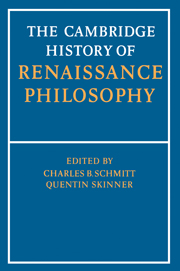Book contents
- Frontmatter
- Introduction
- PART 1 THE INTELLECTUAL CONTEXT
- PART 2 PHILOSOPHY AND ITS PARTS
- 6 Logic and language: Traditional logic
- 7 Logic and language: Humanistic logic
- 8 Natural philosophy: Traditional natural philosophy
- 9 Natural philosophy: The new Philosophy of nature
- 10 Natural philosophy: Astrology and magic
- 11 Moral philosophy
- 12 Political philosophy
- 13 Psychology: The concept of psychology
- 14 Psychology: The organic soul
- 15 Psychology: The intellective soul
- 16 Metaphysics
- 17 Problems of knowledge and action: Fate, fortune, providence and human freedom
- 18 Problems of knowledge and action: Theories of knowledge
- 19 Problems of knowledge and action: Epistemology of the sciences
- 20 Philosophy and humanistic disciplines: Rhetoric and poetics
- 21 Philosophy and humanistic disciplines: The theory of history
- PART 3 SUPPLEMENTARY MATERIAL
- Biobibliographies
- Bibliography
- Index nominun
- Index rerum
- References
15 - Psychology: The intellective soul
from PART 2 - PHILOSOPHY AND ITS PARTS
Published online by Cambridge University Press: 28 March 2008
- Frontmatter
- Introduction
- PART 1 THE INTELLECTUAL CONTEXT
- PART 2 PHILOSOPHY AND ITS PARTS
- 6 Logic and language: Traditional logic
- 7 Logic and language: Humanistic logic
- 8 Natural philosophy: Traditional natural philosophy
- 9 Natural philosophy: The new Philosophy of nature
- 10 Natural philosophy: Astrology and magic
- 11 Moral philosophy
- 12 Political philosophy
- 13 Psychology: The concept of psychology
- 14 Psychology: The organic soul
- 15 Psychology: The intellective soul
- 16 Metaphysics
- 17 Problems of knowledge and action: Fate, fortune, providence and human freedom
- 18 Problems of knowledge and action: Theories of knowledge
- 19 Problems of knowledge and action: Epistemology of the sciences
- 20 Philosophy and humanistic disciplines: Rhetoric and poetics
- 21 Philosophy and humanistic disciplines: The theory of history
- PART 3 SUPPLEMENTARY MATERIAL
- Biobibliographies
- Bibliography
- Index nominun
- Index rerum
- References
Summary
Aristotle's teaching on the intellective soul (De anima III.4–5) serves as the starting-point for Renaissance discussions and, therefore, predetermines the questions raised and the answers given. In the Averroist tradition, this was treated as the beginning of the entire third book. Chapter 4 attempts to define the activity of the intellective soul through analogy to sense-perception and by so doing introduces an interdependence between psychological and epistemological theories. In the fifth chapter, distinguishing between the possible and the agent intellect, Aristotle goes beyond the analogy with sense-perception and alludes to the active role of the soul in the process of knowing. This extremely condensed and enigmatic chapter has provoked many different interpretations, ranging from the outright denial of the agent intellect to the postulation of an agent sense as well, in order to maintain the analogy with sense-perception. For those commentators, however, who kept between these two extremes, III.5 provided both the chance and the need for metaphysical speculation on the ontological status of the intellective soul including its relation to the celestial intelligences and the question of its immortality. It was to this last question that particular attention had to be paid, since on the one hand, Aristotle is not explicit about it, and on the other, Christian doctrine required an affirmation. Thus, for the Middle Ages the question was not whether the human soul was immortal but rather how an immortal soul could fit into the ontological structure of the universe. Consequently, the metaphysical point of view gained prominence, until, in fourteenth-century nominalism, metaphysics lost ground and a new approach was possible from the perspectives of natural philosophy and epistemology.
- Type
- Chapter
- Information
- The Cambridge History of Renaissance Philosophy , pp. 485 - 534Publisher: Cambridge University PressPrint publication year: 1988
References
- 52
- Cited by

